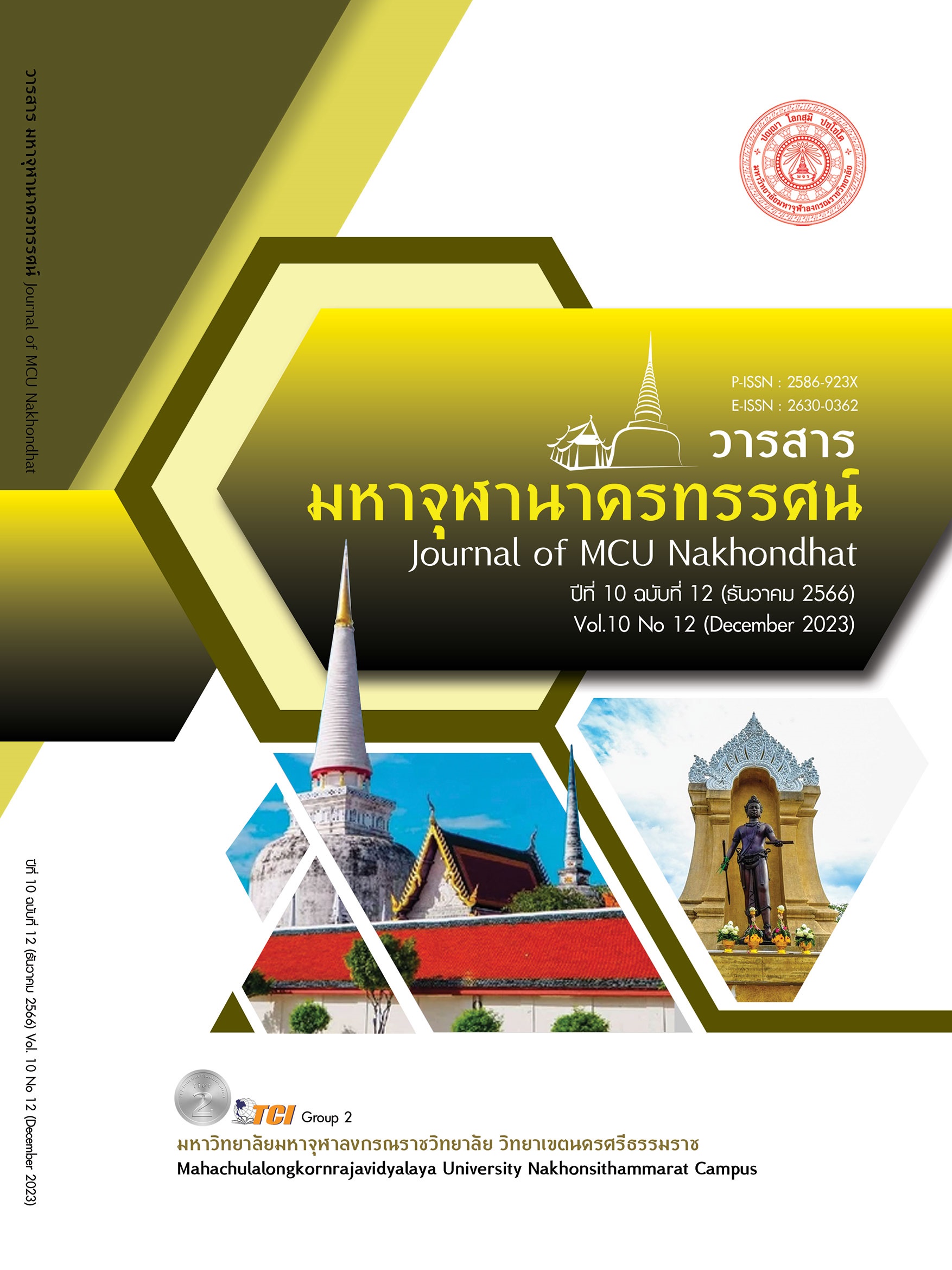FACTORS ASSOCIATION TO BURNOUT SYNDROME IN COVID - 19 OF NURSE KOH SAMUI HOSPITAL
Main Article Content
Abstract
The survey research is cross - sectional survey studies this time has the objective of studying work burnout and factors association to burnout syndrome in COVID - 19 of nurse Koh Samui Hospital. Using the concepts of Maslach's theory. The sample group is professional nurses who worked in Koh Samui Hospital for at least 1 year, totaling 110 people, using Cohen's formula to calculate. Research tools It's a questionnaire. It consists of two parts of information: personal factors and a questionnaire on work burnout for public health officials at Mental Health Center No. 7, Khon Kaen Province. Data were collected using questionnaires and interviews with a sample group over a period of 3 months. Data were analyzed using descriptive statistics, including percentage, mean, and standard deviation. and inferential statistics, including independent t-tests and ANOVA. The research results are as follows: 1) Professional nurses have a low level of burnout during the COVID - 19 situation 59.1 percent, a medium level of 39.1 percent, and a high level of work burnout 1.8 percent. When considering each aspect, it was found that emotional exhaustion and depersonalization are at a low level, but personal success is at a high level. 2) When analyzed the factors affected work burnout in the COVID - 19 situation, the research results found that age groups less than or equal to 30 years, groups with family burdens that were very difficult, departments where work was not directly exposed to COVID - 19, and Job description as a worker affected the state of burnout at work. There is a statistically significant difference (p<0.05). As for the variables of gender, status, length of service, salary, work risk compensation, congenital disease, and hometown, there was no statistical difference (p>0.05).
Article Details

This work is licensed under a Creative Commons Attribution-NonCommercial-NoDerivatives 4.0 International License.
References
กรมประชาสัมพันธ์. (2565). เกาะติดยอดผู้ติดเชื้อโควิด 19 รายสัปดาห์. เรียกใช้เมื่อ 2565 กันยายน 12 จากhttps://www.facebook.com/informationcovid19/
กรมสุขภาพจิต. (2563). องค์ความรู้การดูแลสุขภาพใจในสถานการณ์การระบาด โควิด-19 ใจพร้อม ไม่ยอมป่วย. เรียกใช้เมื่อ 2565 ตุลาคม 23 จาก https://dmh-elibrary.org/items/show/318
กรมสุขภาพจิต. (2564). ภาวะหมดไฟในการทำงาน. เรียกใช้เมื่อ 2565 ตุลาคม 23 จาก https://dmh.go.th/ news/view.asp?id=2445
ทิพรัตน์ บำรุงพนิชถาวร และคณะ. (2565). ปัจจัยที่มีความสัมพันธ์ต่อภาวะหมดไฟในการทางานของผู้ปฏิบัติงานในโรงพยาบาลชุมชนในสถานการณ์การแพร่ระบาดของ Covid-19. วารสารสาธารณสุขมหาวิทยาลัยบูรพา, 7(1), 100-110.
นันทาวดี วรวสุวัส และคณะ. (2560). โครงการวิจัยพัฒนารูปแบบการสร้างเสริมภูมิคุ้มกันทางใจป้องกันภาวะ. ขอนแก่น: ศูนย์สุขภาพจิตที่ 7 จังหวัดขอนแก่น.
นิศากร กะการดี และคณะ. (2563). ความเหนื่อยหน่ายในการทำงานของพยาบาลวิชาชีพเจนเนอเรชั่นวาย. วารสารพยาบาลทหารบก, 21(1), 293-301.
ปองกานต์ ศิโรรัตน์. (2563). การศึกษาเกี่ยวกับภาวะหมดไฟในการทำงาน (Job Burnout) ของพนักงานองค์กรรัฐวิสาหกิจกล่มเจเนอเรชั่นเบบี้บูมเมอร์. เรียกใช้เมื่อ 2566 ตุลาคม 19 จาก https://archive.cm.ma hidol.ac.th/bitstream/123456789/3879
มงคล เอกพันธ์ และคณะ. (2561). ปัจจัยที่มีผลต่อความผูกพันวิชาชีพพยาบาล กรณีศึกษา โรงพยาบาลนครพนม. วารสารมนุษยศาสตรและสังคมศาสตร์, 9(1), 54-77.
มนัสพงษ์ มาลา. (2564). ภาวะเมื่อยล้าหมดไฟในการปฏิบัติงานของอาสาสมัครสาธารณสุขประจําหมู่บ้าน เขตสุขภาพที่ 4. วารสารวิชาการสาธารณสุข, 30(5),944-954.
ศรัณย์ ศรีคำ และคณะ. (2557). ภาวะเหนื่อยล้าในการทำางานและปัจจัยที่เกี่ยวข้อง ของแพทย์ประจำบ้านโรงพยาบาลจุฬาลงกรณ์. วารสารสมาคมจิตแพทย์แห่งประเทศไทย, 59(2), 139-150.
สิมาพร พรมสาร และคณะ. (2564). ความเครียดและภาวะหมดไฟในการทำงานของบุคลากรทางการแพทย์โรงพยาบาลศิริราชระหว่างการรักษาพยาบาลผู้ป่วยโรคติดเชื้อไวรัสโคโรนา 2019. เวชสารแพทย์ทหารบก, 74(3), 197-204.
เอกลักษณ์ แสงศิริรักษ์ และสิรินรัตน์ แสงศิริรักษ์. (2563). ความเครียดและอารมณ์เศร้าของบุคลากรทางการแพทย์ในช่วงการระบาดของโรคติดเชื้อไวรัสโคโรนา 2019. วารสารสมาคมจิตแพทย์แห่งประเทศไทย, 65(4),400-408.


